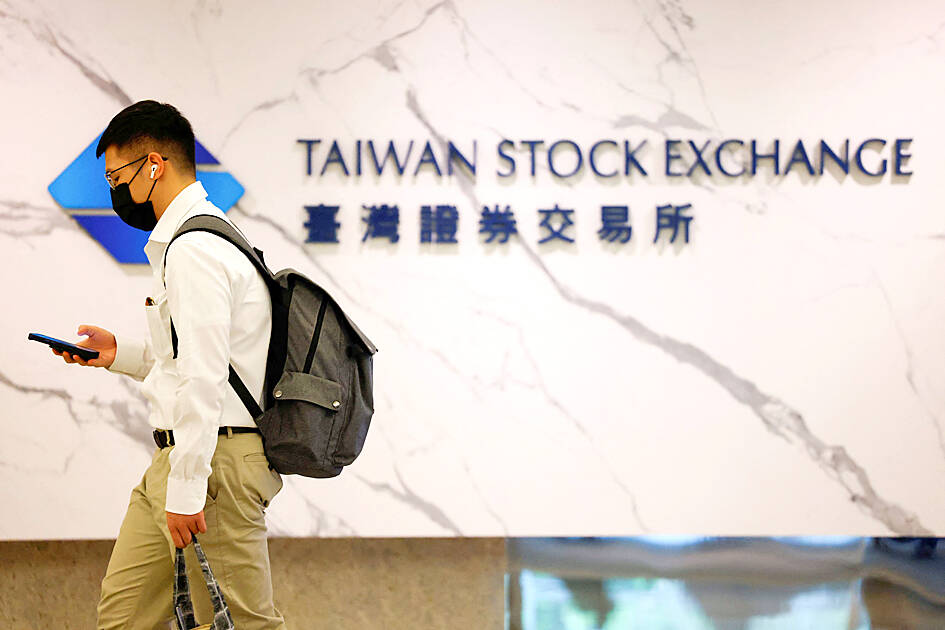All listed firms in Taiwan are required to file a sustainability report this year and complete the disclosure by the end of August to showcase their dedication to environmental, social and governance (ESG) principles, according to the Financial Supervisory Commission (FSC).
Listed companies with a paid-in capital of less than NT$2 billion (US$610.8 million) are required to prepare a sustainability report for last year starting from this year, the commission said. Firms with larger capital already did so last year, it added.
As of August last year, 1,020 firms listed on the Taiwan Stock Exchange (TWSE) or the Taipei Exchange had filed the report for the previous year, constituting 56 percent of the total, data published on the commission’s Web site showed.

Photo: Carlos Garcia, Reuters
That includes 578 mandatory and 442 voluntary submissions, the commission said. Among them, 613 companies obtained third-party assurance in filing their report, it added.
To assist companies in preparing the report, the TWSE has included a sustainability report generation function on its ESG digital platform, which went online on May 6 last year.
After several listed companies were invited to conduct trial generation, the exchange would formally launch the function this month after system adjustments based on the companies’ feedback.
However, the commission reminded listed companies to improve the quality of their sustainability information and avoid greenwashing and untrue statements, which would reduce public trust and affect market competitiveness, it said.
A sustainability report contains qualitative and quantitative information on listed firms’ ESG metrics and insights into their sustainability strategy, goals and initiatives, Taipei-based public relations firm IR Trust Corp (笠信) said.
Firms that fail to file the sustainability report would have difficulty securing bank financing or becoming components of index funds in the future, as banks and fund houses support ESG practices, IR Trust vice president Sandy Cheng (鄭友慈) said last month.
Costs for preparing sustainability report have become more reasonable —from NT$4 million two to three years ago to NT$600,000 these days, Cheng said.
Still, non-tech firms are less ready for the sustainable development trends and in great need of ESG consultancy, she said.

When an apartment comes up for rent in Germany’s big cities, hundreds of prospective tenants often queue down the street to view it, but the acute shortage of affordable housing is getting scant attention ahead of today’s snap general election. “Housing is one of the main problems for people, but nobody talks about it, nobody takes it seriously,” said Andreas Ibel, president of Build Europe, an association representing housing developers. Migration and the sluggish economy top the list of voters’ concerns, but analysts say housing policy fails to break through as returns on investment take time to register, making the

‘SILVER LINING’: Although the news caused TSMC to fall on the local market, an analyst said that as tariffs are not set to go into effect until April, there is still time for negotiations US President Donald Trump on Tuesday said that he would likely impose tariffs on semiconductor, automobile and pharmaceutical imports of about 25 percent, with an announcement coming as soon as April 2 in a move that would represent a dramatic widening of the US leader’s trade war. “I probably will tell you that on April 2, but it’ll be in the neighborhood of 25 percent,” Trump told reporters at his Mar-a-Lago club when asked about his plan for auto tariffs. Asked about similar levies on pharmaceutical drugs and semiconductors, the president said that “it’ll be 25 percent and higher, and it’ll

CHIP BOOM: Revenue for the semiconductor industry is set to reach US$1 trillion by 2032, opening up opportunities for the chip pacakging and testing company, it said ASE Technology Holding Co (日月光投控), the world’s largest provider of outsourced semiconductor assembly and test (OSAT) services, yesterday launched a new advanced manufacturing facility in Penang, Malaysia, aiming to meet growing demand for emerging technologies such as generative artificial intelligence (AI) applications. The US$300 million facility is a critical step in expanding ASE’s global footprint, offering an alternative for customers from the US, Europe, Japan, South Korea and China to assemble and test chips outside of Taiwan amid efforts to diversify supply chains. The plant, the company’s fifth in Malaysia, is part of a strategic expansion plan that would more than triple

Taiwanese artificial intelligence (AI) server makers are expected to make major investments in Texas in May after US President Donald Trump’s first 100 days in office and amid his rising tariff threats, Taiwan Electrical and Electronic Manufacturers’ Association (TEEMA, 台灣電子電機公會) chairman Richard Lee (李詩欽) said yesterday. The association led a delegation of seven AI server manufacturers to Washington, as well as the US states of California, Texas and New Mexico, to discuss land and tax issues, as Taiwanese firms speed up their production plans in the US with many of them seeing Texas as their top option for investment, Lee said. The